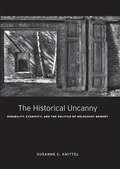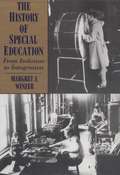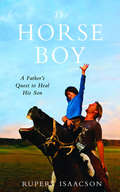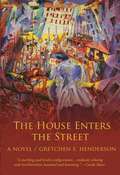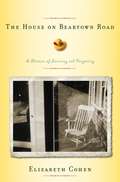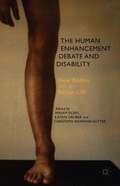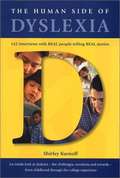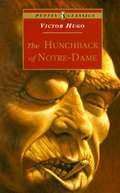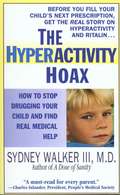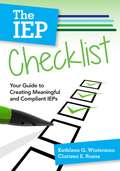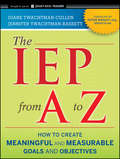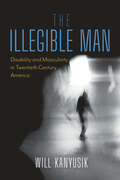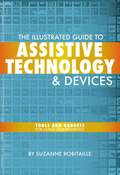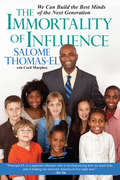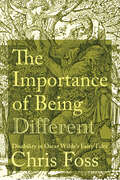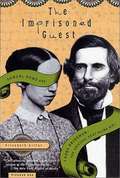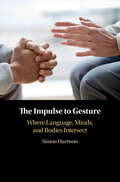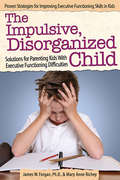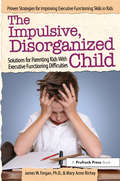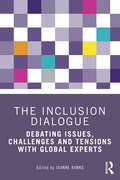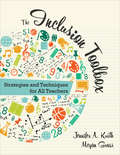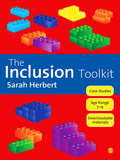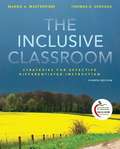- Table View
- List View
The Historical Uncanny: Disability, Ethnicity, and the Politics of Holocaust Memory
by Susanne C. KnittelThe Historical Uncanny explores how certain memories become inscribed into the heritage of a country or region while others are suppressed or forgotten. In response to the erasure of historical memories that discomfit a public’s self-understanding, this book proposes the historical uncanny as that which resists reification precisely because it cannot be assimilated to dominant discourses of commemoration.Focusing on the problems of representation and reception, the book explores memorials for two marginalized aspects of Holocaust: the Nazi euthanasia program directed against the mentally ill and disabled and the Fascist persecution of Slovenes, Croats, and Jews in and around Trieste. Reading these memorials together with literary and artistic texts, Knittel redefines “sites of memory” as assemblages of cultural artifacts and discourses that accumulate over time; they emerge as a physical and a cultural space that is continually redefined, rewritten, and re-presented.In bringing perspectives from disability studies and postcolonialism to the question of memory, Knittel unsettles our understanding of the Holocaust and its place in the culture of contemporary Europe.
The History of Special Education: From Isolation to Integration
by Margret Winzer<p>This comprehensive volume examines the facts, characters, and events that shaped this field in Western Europe, Canada, and the United States. From the first efforts to teach disabled people in early Christian and Medieval eras to such current mandates as Public Law 94-142, this study breaks new ground in assessing the development of special education as a formal discipline. <p>The History of Special Education presents a four-part narrative that traces its emergence in fascinating detail from 16th-century Spain through the Age of Enlightenment in 17th-century France and England to 18th-century issues in Europe and North America of placement, curriculum, and early intervention. The status of teachers in the 19th century and social trends and the movement toward integration in 20th century programs are considered as well.</p>
The Horse Boy: A Father's Quest to Heal His Son
by Rupert IsaacsonWhen his son Rowan was diagnosed with autism, Rupert Isaacson was devastated, afraid he might never be able to communicate with his child. But when Isaacson, a lifelong horseman, rode their neighbor's horse with Rowan, Rowan improved immeasurably. He was struck with a crazy idea: why not take Rowan to Mongolia , the one place in the world where horses and shamanic healing intersected? THE HORSE BOY is the dramatic and heartwarming story of that impossible adventure. In Mongolia , the family found undreamed of landscapes and people, unbearable setbacks, and advances beyond their wildest dreams. This is a deeply moving, truly one-of-a-kind story--of a family willing to go to the ends of the earth to help their son, and of a boy learning to connect with the world for the first time.
The House Enters the Street
by Gretchen Henderson"The House Enters the Street is beautifully written, confident, and complex. I was appreciative of its language and intelligence, mindfulness and scope."--Rikki Ducornet "A demanding and beautiful book, which tracks an exacting landscape with breathtaking inventiveness."--Mary Gordon "A startling and lovely configuration of stories, endlessly echoing and reverberating, haunted and haunting. Gretchen E. Henderson creates a sublime and mysterious music all her own."--Carole Maso It was all about the fruits of labors, not only on land: at sea. Faar's life began at sea. Waves rolled outside his window, where he watched watery horizons. His father had disappeared on a voyage to terra incognita, where horned narwhales swam under ice, where profit lulled into frozen floes. The young Faar began to dream of cloud lagoons, bellied sails, and wind. The wayfaring trait had been inherited. He decided to wander. Cousins on the other side of the world sent him a letter to marry their eldest daughter: S-v-a-n H-a-r-d-t. I-o-w-a, they wrote, without mentioning the distance between bordering seas. Faar assumed oceans existed near their home. He was young, then. This beautiful novel is simultaneously a love letter to the arts and a complex interweaving of characters, stories, landscapes. Scandinavian immigrants in Iowa migrate towards war. A photographer in Arkansas returns to California to repair her family after a devastating fire. Stories unfold, modulating and resonating. This intricate, moving book reminds us of the art a novel can be. Gretchen E. Henderson is a Mellon Postdoctoral Fellow in Writing and Humanistic Studies at Massachusetts Institute of Technology. Working at the intersection of literature, art history, museum studies, disability studies, and music, her creative and critical work explores aesthetics of deformity, museology as narrative strategy, poetics of embodiment, and literary appropriations of music. Her writings have appeared in a number of journals and anthologies, including The Kenyon Review, The Iowa Review, The Sourthern Review, and The &NOW Awards: The Best Innovative Writing. Her first novel Galerie de Difformité was awarded the 2011 Madeleine P. Plonskar Emerging Writer's Prize from &NOW Books. Other works include a critical study of literary appropriations of music, On Marvellous Things Heard (Green Lantern Press), and a poetry chapbook engaging cartographic history, Wreckage: By Land & By Sea (Dancing Girl Press). At MIT, she is working on Ugliness: A Cultural History while continuing the collaborative deformation of her Galerie de Difformité. She lives in Cambridge, Massachusetts.
The House on Beartown Road: A Memoir of Learning and Forgetting
by Elizabeth CohenFrom the book: "Pop-pop-hey!" "Ava-hey!" "Pop-pop, hi." "Ava, hi." The brain of my father and the brain of my daughter have crossed. On their ways to opposite sides of life, they have made an X. They look upon each other with fond familiarity. And they see each other heading to the place they have just come from. On his way out of this life, Daddy has passed her the keys. Instead of thinking about him losing the abilities to speak, to walk, and to negotiate the world, I like to think he has given them to her.
The Human Enhancement Debate and Disability
by Christoph Rehmann-Sutter Miriam Eilers Katrin Gr�berImproving human characteristics goes beyond compensating for an impairment. This book explores the rich and complex relationship between enhancement and impairment, showing that the study of disability offers new ways of thinking about the social and ethical implications of improving the human condition.
The Human Side of Dyslexia: 142 Interviews with Real People Telling Real Stories
by Shirley KurnoffThe author writes: "My goal with this book is to make your journey as a parent a lot less painful and a lot more light-hearted; as a student to show you a way to cope; as a sibling to show you a caring way to understand your brother or sister. This book will give you encouragement and de-emphasize the negativity that comes with a learning difference. It will become your invisible support system, stories for you to emulate, stories to make you laugh or cry, stories that help you open up conversations with family members. On the surface this book taps into a highly visible audience of people associated directly with dyslexia. But these human stories also reach out to a broader audience--educators, the corporate world, even newlyweds with hereditary dyslexia. In essence, anyone who wants to know more about the social side of living with a learning difference and the social implications that come with dyslexia. The Human Side of Dyslexia is about life, about people."
The Hunchback of Notre Dame (Abridged)
by Victor Hugo Robin WaterfieldAn abridgment of the tragic tale of Quasimodo, the hunchback bellringer of Notre-Dame Cathedral
The Hyperactivity Hoax
by Sydney WalkerEach year, millions of children take Ritalin, which means thousands of doctors are diagnosing them with hyperactivity or ADD. But what do these diagnoses mean? Are drugs the answer for these illnesses? And most importantly, is your child getting the proper treatment for his or her problem?In The Hyperactivity Hoax, neuropsychiatrist Dr. Sydney Walker cogently explores the medical minefield of hyperactivity and helps parents arrive at safe, effective answers for their children, without unnecessarily drugging them with potentially dangerous mind-altering medicine. Included in his in-depth guide is:* How to determine if your child needs medical help* How to find a good doctor, a real diagnosis, and effective treatment* How to assert yourself when talking to doctors and school officials* How to evaluate both traditional and alternative approaches to treating hyperactivity and ADD* And much more invaluable information in caring for your child's health.A myth-shattering book no parent can afford to miss!
The IEP Checklist: Your Guide To Creating Meaningful And Compliant IEPs
by Kathleen G. Winterman Clarissa E. RosasHow can you design effective IEPs that improve student outcomes and meet legal requirements? This one-stop IEP guide has the answers your team needs to create great IEPs and put them into action. You'll start with a solid introduction to IEPs: their purpose, their major components, and the legal mandates they need to meet. Then you'll get a comprehensive framework for IEP development, featuring a unique, in-depth checklist that breaks the whole IEP process into small, manageable steps and walks you through each one. Packed with invaluable planning tips, vivid examples, and practice activities, this book is your whole school team's step-by-step guide to meaningful, legally compliant IEPs that help students reach their goals and meet state standards. IEP team members will learn to: assess a student's present level of performance; effectively collaborate during an IEP meeting; use student-centered planning to foster empowerment and leadership; develop meaningful IEP goals that can be easily communicated and measured; write short-term objectives aligned with the student's IEP goals; use progress monitoring data to make instructional decisions; identify accommodations that support a student's specific academic needs; and support successful transitions from school to adulthood. Includes: activities and examples to guide and improve IEP development; reflection questions that deepen understanding; realistic dialogues that highlight key challenges and solutions; ready-to-use tools that help ensure meaningful, compliant IEPs, and ready to use IEP tools such as IEP Rubric, IEP Inventory, Parent Survey, and Teacher Survey.
The IEP From A To Z
by Diane Twachtman-Cullen Jennifer Twachtman-BassettA truly comprehensive, teacher- and parent-friendly guide to creating clear and effective IEPs With the skyrocketing diagnoses of ADHD, autism spectrum disorders, and related conditions in U. S. schools, there is a growing need for information on creating effective IEPs for exceptional students. The IEP From A to Z is a step-by-step guide showing teachers and parents how to get the right education plan in place for students with ADHD, Autism/Asperger's, Emotional/Behavioral Disturbance, and related conditions. Provides easy-to-understand explanations of the special education process along with a wealth of sample effective IEPs Explains what is most important for educators and parents to keep in mind during IEP development Provides content area-specific sample goal and objective templates, general teaching tips for maintaining the IEP, and useful resources From nationally recognized experts in the special education field, this book guides readers through the process of writing thoughtful, intelligent Individualized Education Plans that deliver high-quality, need-based educational programming to exceptional students.
The Illegible Man: Disability and Masculinity in Twentieth-Century America
by Will KanyusikHow does the sudden onset of disability impact the sense of self in a person whose identity was, at least in part, predicated on the possession of what is culturally understood to be an "able" body? How does this experience make visible the structures enabling society's shared notions of heteronormative masculinity?In the United States, the Second World War functioned as a key moment in the emergence of modern understandings of disability, demonstrating that an increased concern with disability in the postwar period would ultimately lead to greater incoherence in the definitions and cultural meanings of disability in America. The Illegible Man examines depictions of disability in American film and literature in twentieth-century postwar contexts, beginning with the first World War and continuing through America's war in Vietnam. Will Kanyusik searches for the origin of discourse surrounding disability and masculinity after the Second World War, examining both literature and film—both fiction and documentary—their depictions of disability and masculinity, and how many of these texts were created by the relationship between the culture industry and the Office of War Information in the 1940s.Supported by original archival research, The Illegible Man presents a new understanding of disability, masculinity, and war in American culture.
The Illustrated Guide to Assistive Technology and Devices: Tools and Gadgets for Living Independently
by Suzanne Robitaille"A Doody's Core Title 2012"This new illustrated guide to assistive technologies and devices chronicles the use of AT/AD - technology used by individuals with disabilities to perform functions that might otherwise be difficult or impossible. This book empowers people to use assistive technologies to overcome some of their physical or mental limitations and have a more equal playing field. It includes real-life examples about how people with disabilities are using assistive technology (AT) to assist them in daily tasks, and discusses emotional issues related to AT/AD.
The Immortality of Influence: We Can Build The Best Minds Of The Next Generation
by Cecil Murphey Salome Thomas-ElSalome Thomas-EL, award-winning educator and the highly-praised author of I Choose to Stay, has helped hundreds of troubled children get into magnet high schools, major colleges, and universities. Yet he still finds himself devastated by the long-ago death of a promising student named Willow Briggs. Salome worked with and consistently encouraged this troubled boy, who ultimately became one of the school's top chess players and students. But when Willow moved on to high school, he found no real positive influences. He struggled academically and was murdered on a street corner at the age of sixteen. More than any other factor, Willow's death launched Salome Thomas-EL on his mission to be a positive influence, and to encourage all of us to set the best example possible for the young people in our lives. The Immortality of Influence is a refreshing, common-sense roadmap to helping kids achieve their dreams in which Thomas-EL movingly describes the methods he has used to help his students succeed. It all started in Vaux Middle School, where he began a chess club to teach boys and girls how to think critically and resolve conflicts with their minds instead of their fists. Not only did his students win eight national championships and become local heroes, they also scored high on the SATs and got into top colleges. When Thomas-EL found himself faced with kids who didn't exercise or eat well, he started a summer program in which the students walked to museums and other cultural events around the city. Recognizing the importance of exposing kids to the world outside their own neighborhoods, he took fifteen African-American students to rural Vermont, where they interacted with white children their age and discovered how much they had in common. All of these students were later accepted to the best magnet high schools. These are just a few examples of what can happen when kids are mentored in a positive way--not only at home, but in the community at large. For parents, guardians, educators--anyone who wants the best for kids, this book is an essential, inspirational reference. It's all about making a difference--not just for today, but forever. Sometimes, it only takes one special person to set a child on the right path, but more often, it does indeed take a village. The Immortality of Influence will inspire you to band together with other caring adults and start making a difference--now.
The Importance of Being Different: Disability in Oscar Wilde's Fairy Tales (Peculiar Bodies)
by Chris FossUnderstanding Oscar Wilde&’s characteristically unique approach to writing difference Over the course of his remarkable career, Oscar Wilde published two volumes of fairy tales: The Happy Prince and Other Tales and A House of Pomegranates. Both collections feature numerous stories with protagonists who may be said to be disability-aligned, owing to their pronounced physical differences. In The Importance of Being Different, Chris Foss explores the way that Wilde&’s stories problematically replicate many of the Victorian era&’s typical responses to disability but also the ways they diverge, offering a more progressive orientation—both through more sympathetic identifications with disability-aligned characters and through a self-conscious foregrounding of the mechanisms of pity and the consumption of pain. The first ever monograph to examine Wilde&’s work through a disability studies lens, this groundbreaking book encompasses all of his fairy tales as well as his writings during and after imprisonment. Even though Wilde unflinchingly represented the extent to which these peculiar bodies suffered rejection by society, he encouraged his readers to embrace them and to advocate for emotional responses that engage love and kindness toward both individual transformation and social change.
The Imprisoned Guest: Samuel Howe and Laura Bridgman, the Original Deaf-Blind Girl
by Elisabeth GitterDid you ever wonder what inspired Helen Keller's mother to have such high hopes for her daughter? The answer is Laura Bridgman, the original deaf-blind girl who inspired Charles Darwin to visit her and also write about her in American Notes.
The Impulse to Gesture: Where Language, Minds, and Bodies Intersect
by Simon HarrisonGestures are central to the way people use language when they interact. This book places our impulse to gesture at the very heart of linguistic structure: grammar. Based on the phenomenon of negation - a linguistic universal with clear grammatical and gestural manifestations - Simon Harrison argues that linguistic concepts are fundamentally multi modal and shows how they lead to recurrent bindings between grammar and gesture when people speak. Studying how speakers express negation multi modally in a range of social and professional contexts, Harrison explores how and when people gesture, what people achieve linguistically and discursively with their gestures, and why we find similar uses of gesture in different languages (including spoken and signed language). Establishing the inseparability of grammar and gesture, this book is an important reference for any researcher interested in the relation between language, gesture, and cognition.
The Impulsive, Disorganized Child
by James Forgan Mary Anne RicheyImpulsive, scattered, lost, unfocused, unprepared, disorganized: These are just a few of the words used to describe kids with executive functioning deficits, which commonly affect many children already diagnosed with ADHD, learning disabilities, and autism. The Impulsive, Disorganized Child: Solutions for Parenting Kids with Executive Functioning Difficulties helps parents pinpoint weak executive functions in their children, then learn how to help their kids overcome these deficits with practical, easy solutions. Children who can't select, plan, initiate, or sustain action toward their goals are children who simply struggle to succeed in school and other aspects of life. Parents need the helpful, proven advice and interactive surveys and action plans in this book to empower them to take positive action to teach their disorganized, impulsive child to achieve independence, success, and a level of self-support.
The Impulsive, Disorganized Child: Solutions for Parenting Kids With Executive Functioning Difficulties
by Mary Anne Richey James W. ForganImpulsive, scattered, lost, unfocused, unprepared, disorganized: These are just a few of the words used to describe kids with executive functioning deficits, which commonly affect many children already diagnosed with ADHD, learning disabilities, and autism. The Impulsive, Disorganized Child: Solutions for Parenting Kids with Executive Functioning Difficulties helps parents pinpoint weak executive functions in their children, then learn how to help their kids overcome these deficits with practical, easy solutions. Children who can't select, plan, initiate, or sustain action toward their goals are children who simply struggle to succeed in school and other aspects of life. Parents need the helpful, proven advice and interactive surveys and action plans in this book to empower them to take positive action to teach their disorganized, impulsive child to achieve independence, success, and a level of self-support.
The Inclusion Dialogue: Debating Issues, Challenges and Tensions with Global Experts
by Joanne BanksThe Inclusion Dialogue: Debating Issues, Challenges and Tensions with Global Experts brings together a series of global expert views on inclusive education, revealing the evolving tensions in this research area and highlighting future directions. Based on fascinating and unique conversations with leading academic experts across the globe, Joanne Banks uses in-depth interviews to examine current debates in special and inclusive education and provides a clear overview of the key tensions which impact policy and practice across different national contexts. Her book also highlights how inclusive education policies do not always translate into inclusive practices in our schools. The dialogue presented in this accessible text provides readers with insights into our conceptual understanding of inclusion within the context of the United Nations Convention on the Rights of People with Disabilities. Through these informal discussions, this book is ideal for academics and researchers working in the area of inclusive and special education, for educators wishing to create more inclusive environments for their students, and for policy-makers seeking to understand what inclusive education looks like on the ground.
The Inclusion Toolbox: Strategies and Techniques for All Teachers
by Jennifer A. Kurth Megan N. GrossThe tools you need to build meaningful inclusive practices into your education program Featuring materials relevant to all stages of implementation, The Inclusion Toolbox is an all-in-one resource that combines research-based strategies and practical tools to help you design and implement a truly inclusive education program. You’ll discover: Step-by-step plans for implementing new programs Guidance on how to strengthen existing inclusive programs Strategies to empower and involve families, students with disabilities, and their peers Tools to assess student interests and develop adaptation plans With user-friendly online resources and practical strategies, this comprehensive guide will help you make inclusion a reality!
The Inclusion Toolbox: Strategies and Techniques for All Teachers
by Jennifer A. Kurth Megan N. GrossThe tools you need to build meaningful inclusive practices into your education program Featuring materials relevant to all stages of implementation, The Inclusion Toolbox is an all-in-one resource that combines research-based strategies and practical tools to help you design and implement a truly inclusive education program. You’ll discover: Step-by-step plans for implementing new programs Guidance on how to strengthen existing inclusive programs Strategies to empower and involve families, students with disabilities, and their peers Tools to assess student interests and develop adaptation plans With user-friendly online resources and practical strategies, this comprehensive guide will help you make inclusion a reality!
The Inclusion Toolkit
by Dr Sarah H. HerbertWith downloadable electronic resources Are you looking for ways to make your classroom more inclusive to children with learning difficulties? The practical strategies suggested in this book are supported by current research into effective teaching and learning, and the author shows you how inclusion friendly teaching could look in your classroom. The book is aimed at the teacher who wishes to respond to the diversity of learning needs of children that are placed within their mainstream classroom, without teaching each child differently. The advice given for teaching all learners aged 7 to 14 will help you ensure that you are providing well for all your learners that only a very few will need substantially different support. Rather than focussing on the differences between learners, the common strategies that will enhance the learning of all, based on the common concerns of class teachers working with pupils who have Special Educational Needs, are identified. Structured around the three areas of memory, motivation, and communication which are key to addressing inclusion friendly teaching, the book covers: - the memory friendly classroom - the motivation friendly classroom - the communication-friendly classroom Ideal for all classroom teachers working with children aged 7 to 14, and with plenty of supporting material available to download from the SAGE website, which works in tandem with each chapter of the book, this toolkit will make inclusive teaching a reality.
The Inclusive Classroom: Strategies for Effective Instruction (4th edition)
by Margo A. Mastropieri Thomas E. ScruggsThis text offers a wealth of practical and proven strategies for successfully including students with disabilities in general education classrooms. The text provides targeted strategies for the subject and skill areas, as well as special needs of individual students, with a strong focus on instructional strategies applied to specific student need areas. An overall theme of "effective, differentiated instruction" is infused throughout the text, relating to those practices that are most closely aligned with academic success. The text is unique in its three-part coverage of 1). the fundamentals of teaching students with special needs, 2). effective general teaching practices, and 3). inclusive practices in specific subject areas. With a strong focus on instructional strategies and how they are applied to specific student need areas, the text goes further by featuring more specific strategies than any other text, and extensive information about the most effective strategies available, and when and how to use them.
